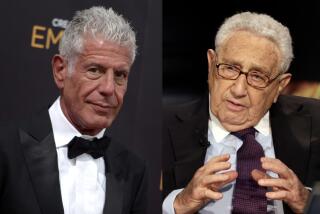William D. Rogers, 80; key advisor to Kissinger helped steer foreign policy
- Share via
William D. Rogers, a Washington lawyer and Latin America expert who became a top advisor to Henry Kissinger at the State Department in the mid-1970s and later worked with him as an international consultant, has died. He was 80.
Rogers, who periodically interrupted his law career for government assignments in Republican and Democratic administrations, died Saturday near Upperville, Va., after a heart attack during a fox hunt.
His most remembered work as a public servant was in the mid-1970s, when he held two posts under Kissinger, who was secretary of state: assistant secretary for inter-American affairs and undersecretary for economic affairs.
During those years, he played prominent roles in sensitive negotiations. They included planning the U.S. hand-over of the Panama Canal, applying financial and political pressure to help end Ian Smith’s white regime in majority-black Rhodesia (now Zimbabwe) and holding secret talks with Cuban emissaries about softening relations with Fidel Castro’s regime. The last effort was scuttled when Castro sent troops to Angola during its civil war.
Rogers also served as a presidential envoy to investigate the 1980 slaying of Catholic U.S. churchwomen in El Salvador by the country’s security forces. He was appointed senior counselor to a Kissinger-led commission that made recommendations about military and economic assistance in Central America in the early 1980s.
In 1982, Rogers was among the founding employees of Kissinger’s New York-based international consulting firm and later became its vice chairman.
Rogers remained a staunch supporter of the former secretary of state, particularly after books and news accounts cast Kissinger’s public service in an unsavory light.
Rogers was incensed over negative portrayals of Kissinger’s legacy on human rights -- and, by extension, his own -- especially regarding the U.S. relationship with Chile during Augusto Pinochet’s dictatorship.
In 2003, he persuaded the State Department to distance itself from a statement by then-Secretary Colin L. Powell that the U.S. policy toward Chile in the 1970s was “not a part of American history that we are proud of.”
Rogers said of Powell: “He was implying that the U.S. was morally responsible for what happened in Chile. He bought the myth.”
Subsequently declassified U.S. documents showed that Rogers pressed his boss to make human rights a central part of private discussions with Pinochet during Kissinger’s visit to Chile.
Kissinger praised Rogers this week, calling him a “great advocate of human rights” and an “absolutely dedicated man who stood for fundamental values.”
But Rogers’ influence on Kissinger is a matter of dispute. Peter Kornbluh, an authority on Chile, noted in his 2003 book “The Pinochet File” that a secret memorandum on Kissinger’s talks with Pinochet “reveals no effort at ‘moral persuasion,’ no mention of democracy and only minimal concern expressed on human rights.”
William Dill Rogers -- no relation to President Nixon’s Secretary of State William Rogers -- was born May 12, 1927, in Wilmington, Del. He majored in international affairs at Princeton University and graduated from Yale University’s law school in 1951.
After two clerkships, including one for U.S. Supreme Court Associate Justice Stanley Reed, Rogers joined the law firm Arnold, Fortas & Porter. At the time, the small firm was gaining recognition for its defense of people branded communists. Rogers participated in the firm’s successful defense of Owen Lattimore, a scholar and political advisor accused of being a leading Soviet spy.
Rogers’ later legal work took him to Latin America, which soon became a consuming interest. From 1961 to 1965, he worked for the Alliance for Progress, an economic aid program started under President Kennedy. Rogers eventually resigned as its deputy coordinator, citing disenchantment with the lack of U.S. financial attention to Latin America as the Vietnam War commanded more money.
After returning to private practice, Rogers began to raise his profile through leadership roles in legal organizations. He was president of the Center for Inter-American Relations and president of the American Society of International Law.
Rogers, a Democrat, said he declined a job offer in 1972 as a Kissinger legal advisor because he did not want to serve in the Nixon administration. The week Nixon resigned, Kissinger said, he hired Rogers to oversee Latin American affairs at the State Department.
He also was co-chairman of the Council on Foreign Relations’ Cuba task force and chairman of the Cuba Policy Foundation, an organization that advocates the normalization of relations with the island nation.
Survivors include his wife of 56 years, Suzanne Rochford “Suki” Rogers of Washington and Upperville; two sons, Dr. William D. Rogers Jr. and Daniel R. Rogers, both of Alexandria, Va.; a sister; and four grandchildren.
More to Read
Sign up for Essential California
The most important California stories and recommendations in your inbox every morning.
You may occasionally receive promotional content from the Los Angeles Times.













